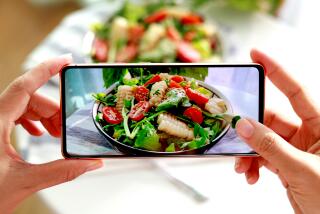Better Diet: An Easy Fix
- Share via
A dietitian’s eternal hope is that Americans will adopt a can-do attitude on nutrition.
But a new survey shows that the “I know I can” people trying to change their diets for the better are in the minority. When Americans are asked about their attitudes on nutrition and eating well, nearly 75% fell into one of two groups: the “I know I should but . . . ,” group or the “don’t bother me” group.
The survey, conducted by the American Dietetic Assn. and co-sponsored by Kraft General Foods and the Good Housekeeping Institute, has made the national group of registered dietitians rethink its approach to educating the public.
“We’re just at the very bottom of the peak we’re climbing,” says Laurie Bruhin, a registered dietitian and spokeswoman for the Connecticut Dietetic Assn. “The survey shows that people are more aware (of nutrition). Now we have to get the knowledge out there so that people understand it. Then it’s another whole step to (put the information into practice).”
The survey makes obvious that “most Americans seem unaware of just how easy it is to improve their diets, and many may be discouraged from even trying,” ADA president-elect Judy Dodd says.
Misconceptions may be one of the stumbling blocks. More than three-quarters of those surveyed said they believed that there are “good foods” and “bad foods.” Actually, the ADA believes that favorite foods--even candy and ice cream--can be incorporated into a healthful, balanced diet.
“But the point is, you’re going for balance,” says Bonnie Tandy Leblang, a registered dietitian and the co-author of the syndicated column “Supermarket Sampler.” “If you’ve had all of the foods you need for a day--enough fruits, vegetables and grains and so forth--and you have extra calories to use, then you can get those calories any way you want and there’s nothing wrong with the candy bar.”
The 1,000 respondents, interviewed by telephone by the Wirthlin Group, were divided into three categories: 38% who believe that they aren’t doing everything they could to upgrade their diets; 36% who aren’t changing their habits at all, and 26% who consider diet and nutrition important and made the effort to eat well.
Even those surveyed who say that they are actively changing their diet aren’t immune to nutrition myths. Some in this group believe that fat should be totally eliminated from the diet.
Forty-five percent of those surveyed said that they are careful about the amount of fat they consume. But a mere 7% surveyed knew the recommended dietary guideline for fat--30% or less of daily calories from fat. “I was astounded,” says Bruhin, adding that she thought people were at least aware of the guideline. She acknowledges that interpreting the fat guideline is more difficult.
Some of those questioned also believed that a no-fat diet is the ultimate goal, the survey said. “People can have fat in their diet,” Leblang says. “Fat in most foods is what carries most of the flavor. We’re not looking for a fat-free diet, we’re looking to reduce the amount of fat.”
Some of the misconceptions arise from Americans’ tendency to view everything as right or wrong. “We’re a black-and-white society--you’re either thin or fat, there are no gray areas,” Bruhin says.
So how can those who fear spending more time in the kitchen and giving up their favorite foods make substantial changes?
“Until now the focus has been on avoidance, not moderation,” Leblang says. “Balance and moderation are the best way to look at things.”
Set realistic goals and make gradual changes, Bruhin says. “Even if you eat ice cream every night a week, then go to frozen yogurt twice a week--that’s a huge fat savings,” she says. Make an easier transition to low-fat dairy products by switching from whole milk to 2% milk, then to 1% and finally to skim milk.
Above all, continue to find pleasure in food. “It should taste good, and you should enjoy food,” Leblang says.






